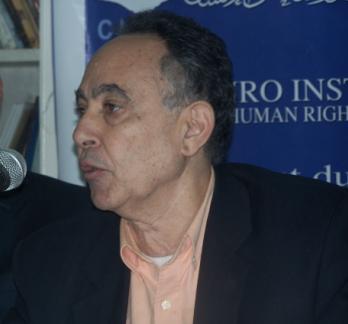Originally Posted in Al-Ahram weekly
By: Bahieddin Hassan
Mohamed Morsi has done more than generations of secularists to convince Egyptians that politics and religion shouldn’t mix, writes Bahieddin Hassan
 President Mohamed Morsi has already entered history as the first elected Islamist president of Egypt. Might he be the last?
President Mohamed Morsi has already entered history as the first elected Islamist president of Egypt. Might he be the last?
Morsi won the presidency with 51 per cent of the vote, thanks to the support of a broad range of secular-minded voters who were voting against his competitor seen as a loyalist of former president Hosni Mubarak. Since then he has wasted no opportunity to squander this political capital, even among some of his Islamist allies.
Morsi began early; before he had been in office even one week, he dealt the first blow against judicial independence. And whereas it took Mubarak more than seven years to start publicly expressing displeasure with the media, Morsi was unable to make it more than seven days before warning that “his patience was wearing thin” with the relative freedom exercised by the media post-revolution. More strikes at the judiciary and media followed, by Morsi himself or his supporters.
From a human rights perspective, Morsi has made history, but in a negative sense. For decades, Egyptians have fought to end the referral of civilians to military trials. As victims of such trials, the Muslim Brotherhood joined this struggle. Because the constitution did not recognise military trials for civilians, suits were filed with the Supreme Constitutional Court challenging the constitutionality of the law that permitted them. Yet only five months after Morsi entered office, the Constituent Assembly — dominated by the Muslim Brotherhood — issued the first constitution in Egypt’s history formalising and legalising military trials for civilians.
For 60 years, the Egyptian labour movement struggled for the right to union pluralism within single professions and factories, in the face of the single, dominant trade union federation controlled by the government and security apparatus. The first independent unions were established before the revolution, but Morsi’s constitution will go down in history as the first to explicitly deny workers this right.
The police state was a principal cause and target of the Egyptian uprising over two years ago — this was why they chose 25 January, National Police Day, to revolt. If Egyptians have achieved anything since the uprising, it is to break down the fear of the police and dismantle vital networks of the police state. But after only six months in office, Morsi reinstated the police’s authority to suppress peaceful protest, praising the police’s “decisiveness” after police killed 50 citizens in only a few hours during a protest in January 2013.
This month, Morsi submitted to the Shura Council the first NGO law in Egypt’s history that formalises the control of the security apparatus over civil society, targeting human rights organisations in particular. Before the revolution, human rights groups struggled due to the interference of the security apparatus in their activities. However, since this interference was illegal, NGOs at times won lawsuits against it. Under Morsi’s proposed law, it would no longer be possible to mount a legal challenge to security interference, as the law stipulates security surveillance of civil society — one of the most serious manifestations of a police state that is being re-established. In tandem with Morsi’s law — and for the first time in Egypt’s history — a court recently sentenced human rights defenders and democracy activists to prison for their civic work.
In 2005, Mubarak’s police hired thugs to sexually harass female demonstrators to deter them from taking part in political protest. As a result of the ensuing national and international outcry and complaints filed with international bodies, Mubarak’s police abandoned this weapon. Yet in January 2013, this weapon was wielded with even greater ferocity, as female demonstrators were subjected to brutal harassment and rape — and this in the era of the first Islamist president to rule Egypt. After being exposed as an orchestrated tactic, sexual harassment suddenly ceased to be used as a political weapon, just as in the Mubarak era.
Eight months into Morsi’s presidency, one of the most prominent Islamist writers in Egypt and supporters of the Brotherhood expressed concerns that the Brotherhood’s appalling performance since coming to power would lead many to believe that the problem is Islam, rather than realising that the real problem lies within the Brotherhood.
It appears, however, that Egyptians — including devout Muslims — are well aware of the true source of their problems. Many anti-Morsi demonstrations set out from mosques, and many women participating in protests against the Brotherhood’s rule are veiled. A few days ago, a newspaper published a report on a coffee shop whose owner had written in prominent letters at the entrance: “Because I’m a Muslim, no Muslim Brothers allowed!” Tellingly, over 15 million Egyptians have signed the petition of the Rebel campaign that calls for Morsi to step down 30 June.
President Morsi will likely go down in history as the anti-secularist who succeeded where secularists had failed for decades: in record time, he has managed to persuade many traditional Muslims that Islam is only one element of the Egyptian character, neither the sole nor principal element, “Egyptian” Islam is different from that of others, including the Brotherhood’s Islam, and that the Islamist state is not a viable political project.
For several decades Morsi and his Brothers have struggled to convince the Egyptians that “Islam is the solution”. But when Egyptians became ready to try this “solution” he spared no opportunity to convince them that, in politics, Islam is no longer a solution.
The writer is director of the Cairo Institute for Human Rights Studies.
Share this Post

